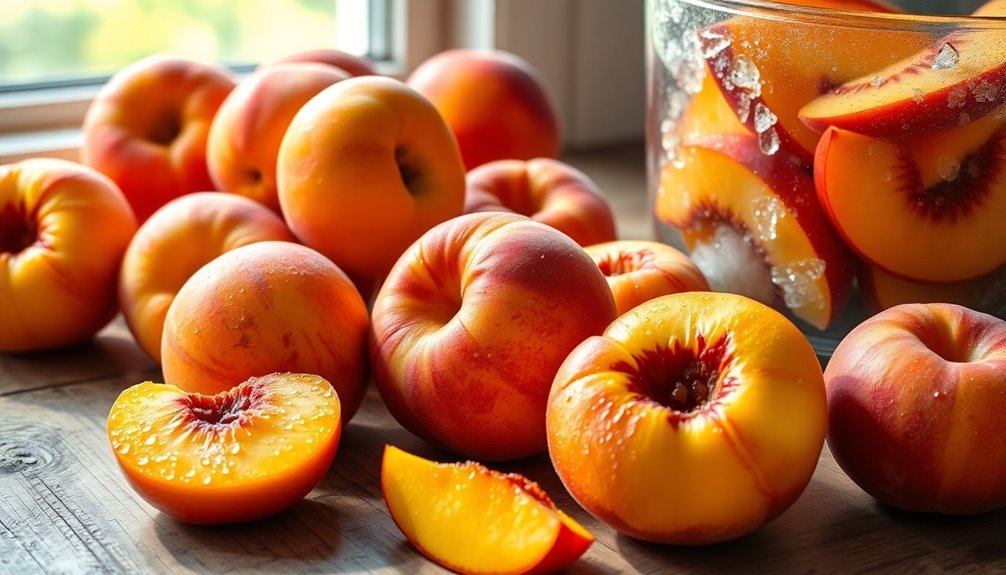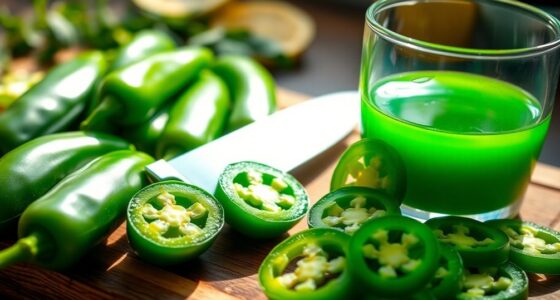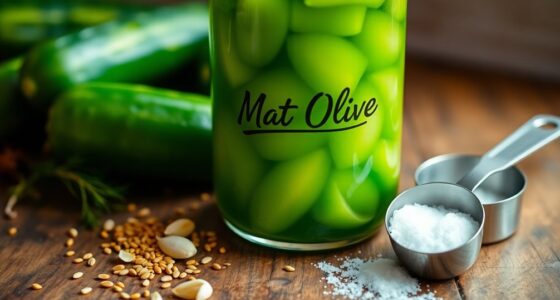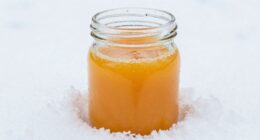To freeze peaches without lemon juice, start by washing and slicing fresh peaches into thin halves or wedges. Lay the slices in a single layer on a parchment-lined baking sheet and freeze for 4 to 6 hours until solid. Once frozen, transfer the slices into labeled freezer-safe bags, removing as much air as possible before sealing. This method keeps their natural sweetness and texture intact. If you want even more tips on preserving peaches, keep exploring!
Key Takeaways
- Wash and dry fresh peaches thoroughly before slicing them into halves or wedges, removing the pit.
- Toss peach slices with natural unsweetened apple juice to prevent browning without using lemon juice.
- Lay the peach slices in a single layer on a parchment-lined baking sheet, ensuring they do not overlap.
- Freeze the slices for 4 to 6 hours until solid, then transfer them to labeled freezer-safe bags.
- Remove excess air from the bags before sealing to prevent freezer burn and preserve quality for up to a year.
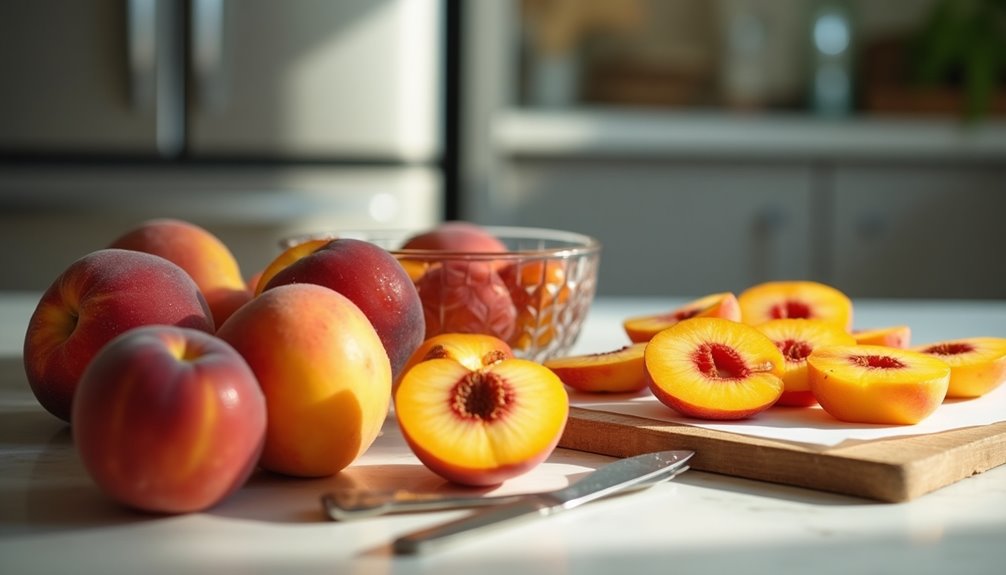
Freezing peaches is a fantastic way to preserve their sweetness for later use, especially when they're in season. If you're looking to enjoy those juicy flavors long after summer has passed, you'll find that freezing peaches without lemon juice is simple and effective. By following a few straightforward steps, you can enjoy peach slices in smoothies, desserts, or savory dishes throughout the year.
Start by washing and drying your fresh peaches thoroughly. This step is crucial as it removes any dirt or residues that might affect the flavor. Once clean, slice the peaches into halves or wedges, removing the pit as you go. If you prefer to freeze peach slices, make sure they're not too thick; thinner slices will freeze more evenly. If you're not using lemon juice to prevent browning, consider tossing the peach slices with natural unsweetened apple juice. This alternative not only helps in preventing browning but also adds a delightful hint of flavor.
Next, lay your peach slices in a single layer on a parchment paper-lined baking sheet. This step is essential for the freezing process, as it allows the slices to freeze individually, preventing them from clumping together. Place the baking sheet in your freezer and let the peach slices chill for about 4 to 6 hours, or until they're solid. This step ensures that each slice freezes properly and retains its texture.
Once your peach slices are fully frozen, it's time to transfer them to labeled freezer-safe bags. When doing this, make sure to remove as much air as possible from the bags. Air removal is a critical step in preventing freezer burn, which can ruin the quality of your peaches. You can use a straw to suck out excess air or simply press down on the bags to push it out before sealing. Labeling the bags with the date will help you keep track of how long they've been stored.
Properly frozen peaches can last in your freezer for up to a year while retaining their flavor and texture. This means you can indulge in your favorite peach recipes at any time, whether it's a refreshing smoothie, a cobbler, or topping on pancakes.
When you're ready to use the frozen peaches, there's no need to thaw them first; you can add them directly to your recipe, allowing them to retain their shape and juiciness.
Freezing peaches without lemon juice isn't only easy but also offers a delicious way to enjoy your summer bounty all year long. With a little effort, you can savor the taste of fresh peaches whenever the craving strikes. So go ahead, grab those ripe peaches, and start the freezing process today!
Frequently Asked Questions
What's the Best Way to Freeze Fresh Peaches?
To freeze fresh peaches, start by washing and drying them thoroughly.
Cut the peaches into slices or halves, removing the pits.
Spread the pieces in a single layer on a parchment-lined baking sheet to prevent clumping.
Freeze them until solid—about 4 to 6 hours.
Once frozen, transfer the peaches to a labeled freezer-safe bag, squeezing out as much air as you can.
They'll stay good for up to a year!
How Do You Keep Peaches From Turning Brown When Freezing?
To keep peaches from turning brown when freezing, you've got a few effective options.
You can coat your peach slices with a tablespoon of apple juice per cup to help prevent oxidation. Alternatively, sprinkle some ground vitamin C on them, or blanch the slices in boiling water for 30 to 60 seconds before chilling in ice water.
Lastly, store the peaches in airtight containers to minimize their exposure to air.
What Does Lemon Juice Do to Peaches?
When it comes to peaches, lemon juice is like a knight in shining armor. It prevents browning by slowing down oxidation, which keeps your peaches looking fresh.
Plus, the acidity enhances their natural sweetness, adding a delightful tang. Just a tablespoon per two cups does the trick!
Not to mention, it boosts the nutritional value with vitamin C. So, if you're looking to preserve that peachy goodness, lemon juice is your go-to.
Do You Add Sugar When Freezing Peaches?
You don't have to add sugar when freezing peaches, but it can enhance their sweetness and create a syrup-like juice if you prefer.
If you decide to use sugar, sprinkle it over the peach slices and let them sit for about 15-30 minutes to release their juices before freezing.
However, many people choose to skip sugar altogether for a healthier option, focusing on washing and properly freezing the peaches to maintain their quality.
Conclusion
Freezing peaches without lemon juice can be a simple, satisfying process. You'll enjoy the sweet aroma of ripe peaches, feel the smooth skin as you slice them, and hear the crunch when you bite into a frozen treat months later. By following these steps, you preserve summer's bounty for chilly winter days. So, gather your peaches, slice them with care, and freeze them with joy. Enjoy the taste of sunshine, even when the world outside is cold.
Cindy thoroughly researches juicing trends, techniques, and recipes to provide readers with practical advice and inspiration. Her writing style is accessible, engaging, and designed to make complex concepts easy to understand. Cindy’s dedication to promoting the advantages of juicing shines through her work, empowering readers to make positive changes in their lives through the simple act of juicing.

